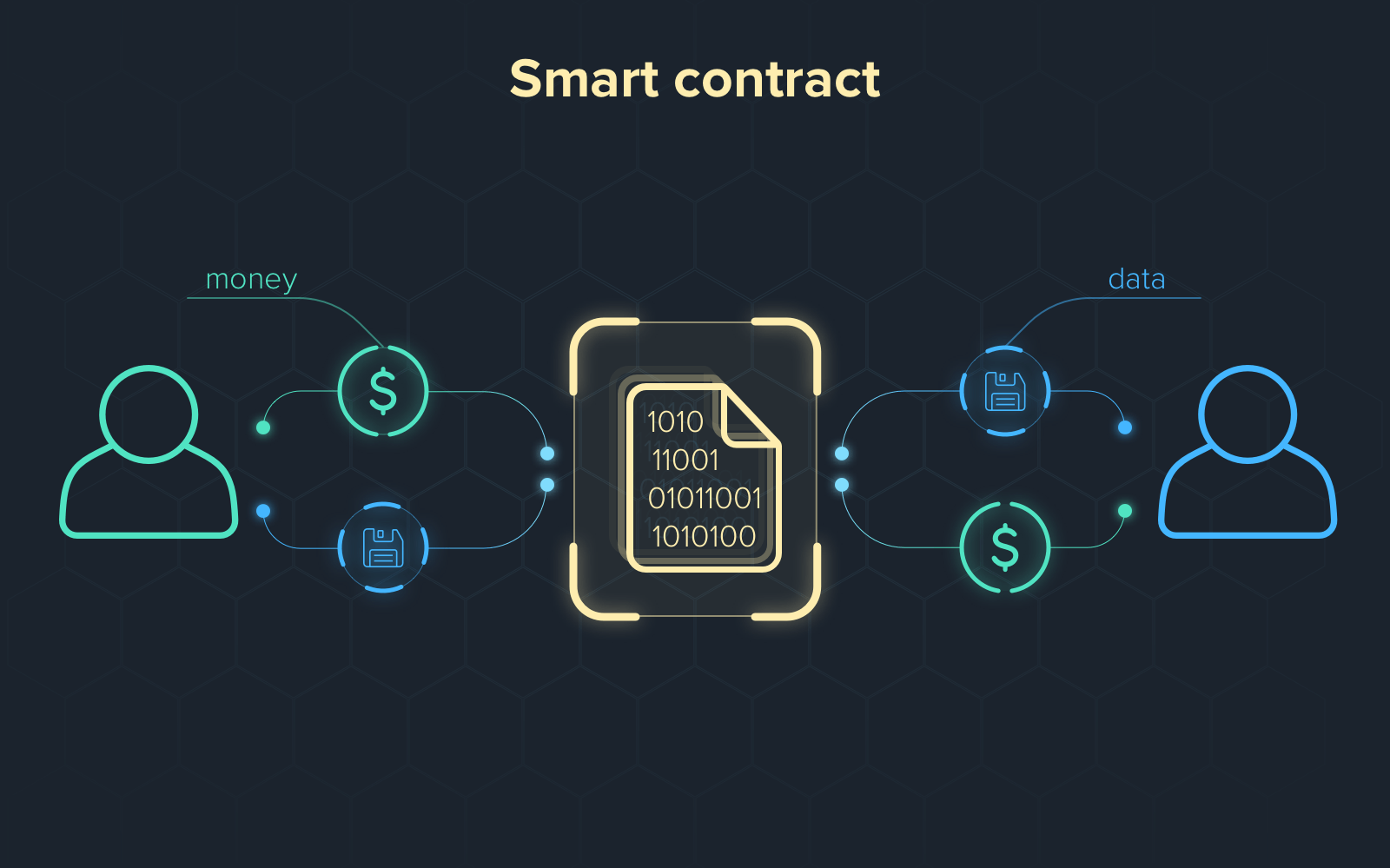Introduction
Welcome to the exciting world of smart contracts! In this digital era, traditional contracts are being revolutionized by the advent of blockchain technology. Smart contracts, powered by blockchain, offer a secure, efficient, and decentralized way to execute agreements without the need for intermediaries.
But what exactly are smart contracts? How do they work? And more importantly, how can you make money from them? In this article, we will explore the world of smart contracts, highlighting their benefits, the technology behind them, and the various ways they can be used to generate income.
Smart contracts are self-executing agreements with the terms of the agreement directly written into code. Once these contracts are deployed on a blockchain, they automatically enforce the terms and provide transparency, tamper-proof security, and efficiency. By cutting out the intermediaries, such as lawyers or brokers, smart contracts streamline the entire process and enable peer-to-peer transactions.
The benefits of smart contracts are manifold. Firstly, they eliminate the need for trust in the traditional sense. The code itself is trusted, ensuring that all parties involved have confidence in the execution of the contract. Secondly, they reduce costs by removing the need for intermediaries, potentially saving time and money. Additionally, smart contracts reduce the risk of fraud and provide transparency, as all transactions are recorded on the blockchain, creating an immutable and auditable record.
Understanding the technology behind smart contracts is crucial for anyone looking to make money from them. Smart contracts are powered by blockchain, a decentralized digital ledger that records transactions across multiple computers. This ensures that the contract’s execution is transparent, secure, and cannot be altered.
There are different types of smart contracts, including financial contracts, supply chain contracts, insurance contracts, and more. These contracts can be created and deployed on various blockchain platforms, such as Ethereum, EOS, or TRON, each offering its own unique features and capabilities.
Creating a smart contract requires familiarity with programming languages and blockchain development. Solidity, for example, is the most widely used programming language for writing smart contracts on the Ethereum blockchain. Platforms like Ethereum also provide developers with tools and frameworks for creating, testing, and deploying smart contracts.
While smart contracts offer numerous advantages, they also come with security risks. It’s essential to follow best practices to mitigate these risks and ensure the integrity and reliability of your smart contracts. Regular security audits, code reviews, and following industry standards are crucial to avoid potential vulnerabilities.
Now that we’ve covered the fundamentals of smart contracts, join us as we explore the different use cases for smart contracts and discover the various ways you can make money from this exciting technology.
What are Smart Contracts?
Smart contracts are digital agreements that are programmed to automatically execute predefined actions once certain conditions are met. These agreements are stored on a blockchain, a decentralized and immutable ledger, ensuring transparency, security, and reliability.
Unlike traditional contracts, which require intermediaries such as lawyers or brokers to enforce and regulate the agreement, smart contracts are self-executing. The terms and conditions of the contract are written in code, removing the need for trust between parties and enabling direct peer-to-peer transactions.
Smart contracts operate based on the “if-then” principle. They use logic and predefined rules to execute actions when specific conditions are fulfilled. For example, a smart contract can be programmed to release payment to a seller once a buyer confirms the receipt of goods. This automation eliminates the need for manual intervention and reduces the risk of fraud or non-compliance.
The execution of smart contracts is facilitated by blockchain technology. Blockchain acts as a decentralized ledger, recording and verifying all transactions. Once a smart contract is deployed on the blockchain, it becomes a permanent part of the network, ensuring transparency and traceability.
Smart contracts have several distinguishing features that make them unique. Firstly, they are tamper-proof. Once a smart contract is deployed on the blockchain, it cannot be altered or modified, providing an immutable record of all transactions and agreements. This enhances trust and reduces the risk of fraudulent activities.
Secondly, smart contracts are transparent. All participants in the network can view the terms and conditions of the contract, ensuring visibility and accountability. This transparency fosters a level playing field and minimizes disputes or misunderstandings.
Another key feature of smart contracts is their efficiency. By automating the execution of agreements, smart contracts eliminate the need for intermediaries, reducing costs and saving time. The streamlined process enables faster transactions and removes unnecessary paperwork, making it more convenient for all parties involved.
Smart contracts have the potential to revolutionize various industries and use cases. They can be applied to finance, supply chain management, real estate, healthcare, insurance, and more. The trustless nature of smart contracts makes them ideal for scenarios where parties may not trust each other explicitly, or where efficiency and transparency are paramount.
In summary, smart contracts are digital agreements that enforce themselves based on pre-programmed conditions. They leverage blockchain technology to ensure transparency, security, and efficiency. By removing intermediaries and automating processes, smart contracts have the potential to streamline transactions and revolutionize various industries.
Benefits of Smart Contracts
Smart contracts offer a myriad of benefits, revolutionizing traditional contract agreements by enhancing efficiency, security, and transparency. Let’s explore some of the key advantages of utilizing smart contracts in various industries and scenarios.
One of the most significant benefits of smart contracts is their ability to eliminate intermediaries. Traditional contracts often require lawyers, brokers, or other third parties to oversee and enforce the agreement. This not only adds complexity but also increases costs. With smart contracts, the need for intermediaries is bypassed entirely. The self-executing nature of smart contracts means that the agreed-upon conditions are automatically enforced without any human intervention, reducing both time and costs.
Transparency is another fundamental advantage of smart contracts. As smart contracts are deployed on a blockchain, all transactions and actions related to the contract are recorded on the decentralized ledger. This provides an immutable and auditable record of activities, enabling all participants to have full visibility into the agreement. This transparency reduces the risk of disputes, fraud, or ambiguity, as all parties can verify the terms and conditions of the contract in real-time.
Smart contracts also offer enhanced security. Blockchain technology, the underlying technology powering smart contracts, is renowned for its robust security measures. Once a smart contract is deployed on the blockchain, it becomes tamper-proof and cannot be altered without consensus from the network participants. The decentralized nature of blockchain provides an extra layer of security, making it extremely difficult for malicious actors to manipulate or compromise the contract. This level of security instills trust among participants and reduces the risk of fraud.
Efficiency is a significant advantage of smart contracts. With traditional contracts, the process of negotiating, drafting, and enforcing can be time-consuming and cumbersome. Smart contracts eliminate the need for manual intervention by automating the execution of agreements. By using predefined rules and logic, smart contracts ensure that once the conditions are met, the contract is automatically executed, saving time and effort for all parties involved. This efficiency also extends to the administrative tasks associated with contracts, as the automation reduces paperwork and streamlines the process.
Additionally, smart contracts provide scalability. As they are digital and executed on a blockchain, they can handle a large number of transactions simultaneously. This scalability is particularly beneficial for industries that require high-volume transactions, such as finance or supply chain management.
In summary, the benefits of smart contracts are numerous. They eliminate intermediaries, enhance transparency, improve security, streamline processes, and provide scalability. By leveraging these advantages, smart contracts have the potential to transform how contracts are executed across various industries, making them a powerful tool for driving efficiency and trustworthiness in the digital age.
Understanding the Technology Behind Smart Contracts
To truly grasp the concept of smart contracts, it’s essential to have a basic understanding of the technology that powers them: blockchain. Blockchain is a decentralized and distributed ledger that records transactions across multiple computers, ensuring transparency, security, and immutability.
In the context of smart contracts, blockchain serves as the underlying infrastructure on which these digital agreements are executed. Smart contracts are written in code and stored on the blockchain, enabling automated and self-executing transactions without the need for intermediaries.
Blockchain technology ensures the integrity and security of smart contracts through a few key features. Firstly, blockchain is decentralized, which means there is no single entity controlling the network. Instead, transactions and smart contracts are verified and recorded by a network of computers, known as nodes, spread across the network. This eliminates the risk of a single point of failure or manipulation.
Secondly, blockchain ensures transparency. Once a smart contract is deployed on the blockchain, it becomes visible to all participants in the network. This transparency allows for easy verification and validation of the terms and conditions of the contract, minimizing disputes and ensuring accountability.
Thirdly, blockchain provides immutability. Once a transaction or smart contract is recorded on the blockchain, it cannot be altered or tampered with. Each new block added to the chain contains a unique cryptographic hash, ensuring the integrity of the entire blockchain. This immutability feature adds a layer of trust and security to smart contracts, as it becomes nearly impossible to manipulate or manipulate the terms of an agreement.
Blockchain technology is powered by consensus algorithms, which are used to validate and approve transactions and smart contracts. The most common consensus mechanism used is Proof of Work (PoW), as seen in Bitcoin, which requires nodes to solve complex mathematical puzzles to secure the network and validate new transactions. Other consensus mechanisms, such as Proof of Stake (PoS), are also used in different blockchain networks.
It’s important to note that smart contracts do not have the ability to access data or interact with external systems on their own. They rely on oracles, which are external sources providing real-world data, to trigger the execution of certain conditions within the smart contract. For example, a smart contract connected to an insurance policy might rely on an oracle to verify whether an event, like a natural disaster, has occurred and trigger the automatic payout.
In summary, the technology behind smart contracts is blockchain. Blockchain provides the decentralized, transparent, and secure environment necessary for the execution of these self-executing digital agreements. Understanding the fundamentals of blockchain technology is crucial for anyone looking to delve into the world of smart contracts and leverage their potential in driving efficiency and trustworthiness in various industries.
Different Types of Smart Contracts
Smart contracts are a versatile tool that can be applied to various industries and use cases. Here are some of the different types of smart contracts and their applications:
1. Financial Contracts: Smart contracts can be used in the financial industry for a wide range of applications. For example, they can automate transactions such as payment settlements, remittances, and asset transfers. Smart contracts can also be utilized for complex financial instruments like derivatives, where the terms, conditions, and payout calculations can be programmed into the contract.
2. Supply Chain Contracts: Smart contracts can revolutionize supply chain management by providing transparency, traceability, and efficiency. They can automate various processes involved in the supply chain, including tracking inventory levels, verifying product authenticity, managing purchase orders, and facilitating payments between suppliers and manufacturers. This automation reduces paperwork, eliminates human error, and ensures trust among supply chain participants.
3. Insurance Contracts: Smart contracts can enhance the insurance industry by automating claims processing and policy management. By using smart contracts, insurers can streamline the verification and settlement of claims, accelerating the process and reducing the administrative burden. Additionally, smart contracts can automate the execution of insurance policies, triggering payouts based on predefined conditions, such as a flight being delayed or a specific event occurring.
4. Real Estate Contracts: Smart contracts have the potential to revolutionize the real estate industry by automating property transfers, rental agreements, and mortgage contracts. Smart contracts can eliminate the need for intermediaries, such as real estate agents or lawyers, by automating the process of property transactions. This streamlines the process, reduces costs, and provides a transparent and secure way to transfer ownership.
5. Intellectual Property Contracts: Smart contracts can be utilized in the management of intellectual property rights, such as copyrights, patents, and trademarks. By using smart contracts, artists, inventors, and creators can automate the licensing, distribution, and monetization of their intellectual property, ensuring that they receive fair compensation for their work.
6. Governance Contracts: Smart contracts can be used for governance purposes, enabling decentralized decision-making and consensus. Decentralized autonomous organizations (DAOs) utilize smart contracts to automate voting, fund allocation, and decision-making processes. This allows stakeholders to participate in the governance of an organization directly and transparently.
These are just a few examples of the different types of smart contracts and their applications. Smart contracts have the potential to disrupt and transform numerous industries by optimizing processes, reducing costs, enhancing transparency, and promoting trust among parties involved.
Popular Platforms for Smart Contracts
Smart contracts can be developed and deployed on various blockchain platforms, each with its own unique features and capabilities. Here are some of the most popular platforms for creating and executing smart contracts:
1. Ethereum: Ethereum is the leading platform for smart contracts and decentralized applications (DApps). It introduced the concept of smart contracts and provides a robust and mature environment for developing and executing them. Ethereum’s native programming language, Solidity, allows developers to write and deploy smart contracts with ease. Ethereum also offers tools like Remix IDE and Truffle framework, making it accessible to developers of different skill levels.
2. EOS: EOS is another popular platform for smart contracts, known for its high scalability and low transaction fees. EOS utilizes a delegated proof-of-stake (DPoS) consensus algorithm, which allows for fast transaction processing and high throughput. The platform provides a developer-friendly environment and supports multiple programming languages, including C++ and Rust. EOS also offers features such as parallel processing, enabling efficient execution of smart contracts.
3. TRON: TRON is a blockchain platform that focuses on creating a decentralized entertainment ecosystem. It provides a robust infrastructure for developing and executing smart contracts, particularly for applications in the gaming and entertainment industries. TRON offers high scalability, fast transaction speeds, and low fees. The platform supports multiple programming languages, including Solidity and Java, and provides development tools like TronWeb and TronBox.
4. Binance Smart Chain (BSC): Binance Smart Chain is a blockchain platform developed by the popular cryptocurrency exchange, Binance. It aims to provide an alternative to Ethereum by offering faster transaction speeds and lower fees. BSC is compatible with the Ethereum Virtual Machine (EVM), meaning that smart contracts written in Solidity can be easily deployed on the BSC network. This compatibility allows developers to leverage existing Ethereum tools and resources for building smart contracts on BSC.
5. Neo: Neo is a blockchain platform that aims to create a smart economy by combining smart contracts with digital identities and digital assets. Neo utilizes a delegated Byzantine Fault Tolerance (dBFT) consensus mechanism, which ensures fast transaction processing and high scalability. Neo supports multiple programming languages, including C#, Java, and Python, making it accessible to developers with different skill sets. The platform also provides developer-friendly tools and resources, such as NeoVM and Neo-CLI.
These are just a few examples of the popular platforms for smart contracts. Each platform offers unique features, programming languages, and development tools. When choosing a platform, it’s important to consider factors such as scalability, transaction speed, community support, and compatibility with existing infrastructure. By selecting the right platform, developers can leverage the full potential of smart contracts to create innovative and decentralized applications.
How to Create a Smart Contract
Creating a smart contract requires a solid understanding of blockchain technology and programming languages. Here’s a general overview of the steps involved in creating a smart contract:
1. Define the Contract: Start by clearly defining the purpose and requirements of the smart contract. Determine the conditions, rules, and actions that the contract should execute. This involves identifying the parties involved, the trigger events, and the desired outcome.
2. Choose a Platform and Language: Select a blockchain platform that supports smart contracts, such as Ethereum, EOS, or TRON. Each platform has its own programming language, so choose the language that you are comfortable with or learn the specific programming language for the platform. For example, Ethereum uses Solidity, EOS supports C++, and TRON supports Solidity and Java.
3. Write the Smart Contract Code: Use the programming language and toolset provided by the chosen platform to write the code for the smart contract. Define the variables, functions, and conditions based on the contract requirements. Take into consideration the security and efficiency of the code, following best practices and industry standards.
4. Test the Smart Contract: It’s crucial to thoroughly test the smart contract before deploying it to the blockchain. Use testing frameworks and tools specific to the platform to simulate different scenarios and ensure the contract behaves as intended. Conduct both unit testing and integration testing to identify any bugs, vulnerabilities, or logical errors.
5. Deploy the Smart Contract: Once the smart contract has been successfully tested, it’s time to deploy it to the blockchain platform. Each platform provides specific tools and interfaces for deploying smart contracts. Follow the platform’s documentation and guidelines to deploy the contract onto the chosen blockchain network. Keep in mind that deploying a contract may require payment of fees or gas, which varies depending on the platform.
6. Interact with the Smart Contract: After deployment, the smart contract becomes part of the blockchain network. You can interact with the contract by calling its functions or triggering events. This can be done through a user interface, a command-line interface, or programmatically through APIs.
7. Maintain and Update the Smart Contract: Smart contracts may require maintenance and updates over time. It’s essential to monitor the contract’s performance, security, and functionality. Assess and implement any necessary updates or improvements to ensure the contract continues to operate effectively.
Creating a smart contract involves careful planning, coding, testing, and deployment. It requires familiarity with blockchain technology, the chosen platform, and the programming language. By following these steps and continuously enhancing the contract, you can create a robust and efficient smart contract to streamline processes and drive innovation in various industries.
Security Risks and Best Practices for Smart Contracts
While smart contracts offer numerous benefits, they also come with certain security risks. Understanding and mitigating these risks is crucial to ensure the integrity and reliability of your smart contracts. Here are some common security risks and best practices to enhance the security of your smart contracts:
1. Code Vulnerabilities: Smart contracts are written in code, and any vulnerabilities in the code can be exploited by hackers. It’s important to follow best coding practices to minimize the risk of vulnerabilities. This includes writing clean, modular, and well-documented code, avoiding unnecessary complexity, and conducting thorough code reviews and audits. Adopting industry-standard security frameworks and utilizing static analysis tools can also help identify potential vulnerabilities.
2. Lack of Formal Verification: Formal verification involves mathematically proving the correctness of a smart contract. Conducting formal verification helps ensure that the contract behaves as intended and is free from bugs or logical errors. While it might not be feasible for all contracts, utilizing formal verification methods for critical and high-value contracts can significantly enhance the security of the contract.
3. External Dependency Risks: Smart contracts often rely on external data or oracles to trigger certain conditions or execute actions. However, these external dependencies can introduce security risks. It’s important to validate and verify the integrity and reliability of the external sources and ensure they cannot be manipulated or tampered with. Consider implementing multiple oracles or incorporating data from reputable and decentralized sources to mitigate the risks associated with external dependencies.
4. Insufficient Input Validation: Smart contracts should thoroughly validate and sanitize input data to prevent malicious exploitation. Input validation should include checking the format, range, and type of input parameters to ensure they adhere to the contract’s requirements. Implementing input validation and sanitization logic within the contract can help minimize the risk of input-related attacks, such as integer overflow or denial-of-service attacks.
5. Regular Code Audits and Updates: Security threats and vulnerabilities constantly evolve, so it’s crucial to conduct regular code audits and updates. Keep up with the latest security best practices and industry standards. Engage security experts or third-party auditors to review the contract code and identify potential vulnerabilities. Stay informed about security advisories and patches released by the platform or framework you are using and promptly apply updates to mitigate any known security risks.
6. User Education and Transparency: Educate your users about the contract’s functionality, risks, and limitations. Providing clear and transparent information about the contract’s operations and potential risks can help users make informed decisions. Communicate any updates or changes to the contract to ensure transparency and maintain user trust.
7. Test on Testnets Before Mainnet Deployment: Before deploying your smart contract on the mainnet, thoroughly test it on testnet environments. Testnets replicate the mainnet environment but with virtual or test cryptocurrencies, allowing you to simulate real-world scenarios and detect potential issues or vulnerabilities. Test your contract under various conditions, and ensure all the contract’s functionalities work as intended before deploying to the live network.
In summary, securing smart contracts requires a proactive approach and adherence to best practices. By employing robust coding standards, conducting thorough audits, validating external dependencies, and keeping up with security updates, you can significantly enhance the security and reliability of your smart contracts. Promote transparency and user education to build trust and confidence among users and stakeholders.
Use Cases for Smart Contracts
Smart contracts have the potential to revolutionize various industries and use cases by streamlining processes, enhancing transparency, and reducing costs. Let’s explore some of the key use cases where smart contracts can make a significant impact:
1. Supply Chain Management: Smart contracts can transform supply chain management by providing transparency, traceability, and efficiency. They can automate and streamline various processes, such as tracking inventory levels, verifying product authenticity, managing purchase orders, and facilitating payments between suppliers and manufacturers. This automation reduces paperwork, eliminates human error, and ensures trust among supply chain participants, resulting in better coordination and improved efficiency.
2. Identity Verification and Authentication: Smart contracts can be utilized for verifying and authenticating identity in a secure and decentralized manner. By utilizing digital identities and biometric data stored on the blockchain, smart contracts can provide a reliable and tamper-proof method for identification and authentication. This is particularly useful in industries such as finance, healthcare, and government services where verifying identity is paramount.
3. Voting and Governance: Smart contracts can revolutionize voting and governance systems by providing transparency and security. Decentralized autonomous organizations (DAOs) leverage smart contracts for conducting automated and transparent voting processes. Each voter’s identity is securely verified, and the voting results are recorded on the blockchain, eliminating the risk of fraud or vote manipulation. Additionally, smart contracts can automate governance processes, allowing stakeholders to participate directly in decision-making.
4. Insurance and Claims Processing: Smart contracts can streamline insurance processes, particularly claims processing. By automating the verification and settlement of claims, smart contracts reduce paperwork, accelerate the process, and eliminate the need for intermediaries. Insurance policies can be programmed into smart contracts, triggering automatic payout based on predefined conditions, such as flight delays, adverse weather events, or health incidents.
5. Financial Services: The financial industry can benefit greatly from smart contracts. They can automate processes such as payment settlements, remittances, and asset transfers. Smart contracts can also be applied to complex financial instruments like derivatives, where contractual terms, conditions, and payout calculations can be pre-programmed. By removing intermediaries and automating transactions, smart contracts increase efficiency and transparency while reducing costs.
6. Real Estate Transactions: Smart contracts can revolutionize real estate transactions by digitizing and automating the process. They can facilitate secure and transparent property transfers, rental agreements, and mortgage contracts. Smart contracts eliminate intermediaries, such as real estate agents or lawyers, reducing costs and eliminating the risk of fraudulent activities. Additionally, the use of smart contracts ensures transparency and trust between buyers and sellers.
These are just a few examples of the numerous use cases for smart contracts. Smart contracts have the potential to streamline processes, enhance transparency, and reduce costs across various industries, ranging from healthcare and supply chain management to entertainment and intellectual property rights. By leveraging the power of smart contracts, organizations can experience increased efficiency, improved security, and enhanced trust among stakeholders.
Making Money from Smart Contracts
Smart contracts not only offer efficiency and transparency but also provide opportunities to generate income. Here are several ways you can make money from smart contracts:
1. Creating and Selling Smart Contracts: If you have expertise in blockchain development and smart contract programming, you can create and sell smart contracts to individuals or businesses in need. Smart contracts can range from simple agreements to more complex financial instruments. By offering high-quality and well-tested smart contracts, you can monetize your skills and knowledge in this growing field.
2. Offering Smart Contract Consultation: If you have in-depth knowledge of smart contracts and their applications, you can provide consultation services to organizations looking to leverage this technology. Educate businesses about the benefits and potential use cases of smart contracts, assess their specific needs, and provide guidance on implementing and deploying smart contracts in their operations. By offering valuable insights and expertise, you can generate income as a smart contract consultant.
3. Developing Decentralized Applications (DApps): Smart contracts are at the heart of decentralized applications (DApps) built on blockchain platforms. If you have programming skills and a solid understanding of smart contracts, you can develop DApps that leverage the capabilities of smart contracts. These DApps can provide value-added services to users or address specific industry needs. Monetize your DApp by charging transaction fees, offering premium services, or monetizing data generated within the application.
4. Participating in Yield Farming and DeFi: Decentralized finance (DeFi) has gained significant traction in recent years. By utilizing smart contracts, DeFi protocols allow users to earn passive income through various mechanisms such as liquidity provision, yield farming, staking, or lending. Research and identify profitable DeFi projects and invest your digital assets accordingly to earn yields or governance tokens, ultimately generating income from your participation in the DeFi ecosystem.
5. Security Audits and Smart Contract Testing: With the increasing demand for secure smart contracts, organizations are willing to pay for security audits and thorough testing of their smart contracts. If you possess expertise in contract security analysis, you can offer services to review, test, and identify potential vulnerabilities in smart contracts. By ensuring the integrity and reliability of smart contracts, you can contribute to the overall security of the blockchain ecosystem and monetize your skills in this specialized field.
6. Participating in Blockchain Networks and Consensus Mechanisms: Some blockchain platforms offer rewards for participants who validate transactions or secure the network through consensus mechanisms such as proof-of-stake (PoS) or delegated proof-of-stake (DPoS). By staking your digital assets or running a validator node, you can earn rewards in the form of transaction fees or native tokens issued by the blockchain network.
7. Developing Add-ons and Tools for Smart Contract Development: Smart contract developers often require tools, frameworks, or add-ons to streamline their development process. If you possess the skills, you can develop and sell such tools or services that assist developers in creating, testing, and deploying smart contracts. From compiler extensions and code analysis tools to contract deployment platforms, there is a growing demand for innovative solutions that make smart contract development more efficient and accessible.
These are just a few examples of how you can make money from smart contracts. The evolving blockchain landscape offers a range of opportunities for individuals and businesses to leverage smart contracts and generate income. Whether it’s creating contracts, offering consultation services, developing DApps, or participating in DeFi, there are various avenues to explore and capitalize on the potential of smart contracts in the digital economy.
Conclusion
Smart contracts have emerged as a revolutionary technology, transforming the way agreements are executed, and transactions are conducted. They provide numerous benefits, including efficiency, transparency, and security, while reducing costs and eliminating intermediaries. As we have explored, smart contracts have versatile applications across industries such as supply chain management, finance, insurance, and governance.
Understanding the technology behind smart contracts, such as blockchain and programming languages like Solidity, is crucial for creating and deploying these digital agreements effectively. By following best practices in coding, testing, and security, smart contracts can be made robust, reliable, and resilient to potential vulnerabilities.
Smart contracts also offer opportunities to generate income. Whether it’s by creating and selling contracts, providing consultation services, developing decentralized applications, participating in DeFi, or offering security audits, individuals and businesses can monetize their expertise in this space.
However, it’s important to stay vigilant and keep up with the evolving landscape of smart contracts. As with any technology, security risks and challenges may arise, requiring continuous monitoring, updating, and adherence to best practices.
In conclusion, smart contracts have the potential to revolutionize countless industries and streamline processes in a secure and transparent manner. They foster trust, reduce costs, and create new avenues for generating income. As the technology continues to advance, smart contracts will likely play a pivotal role in shaping the future of digital transactions and agreements.

























